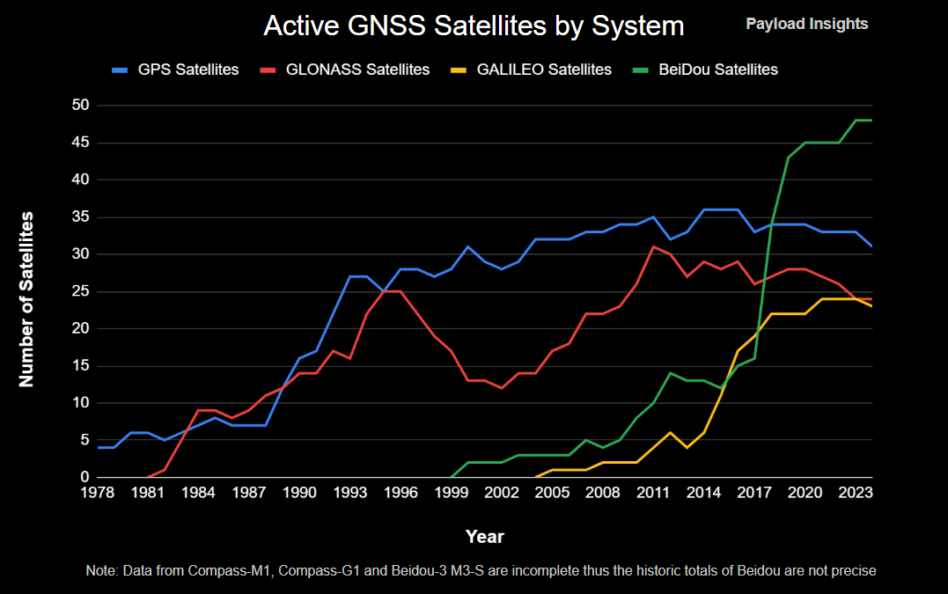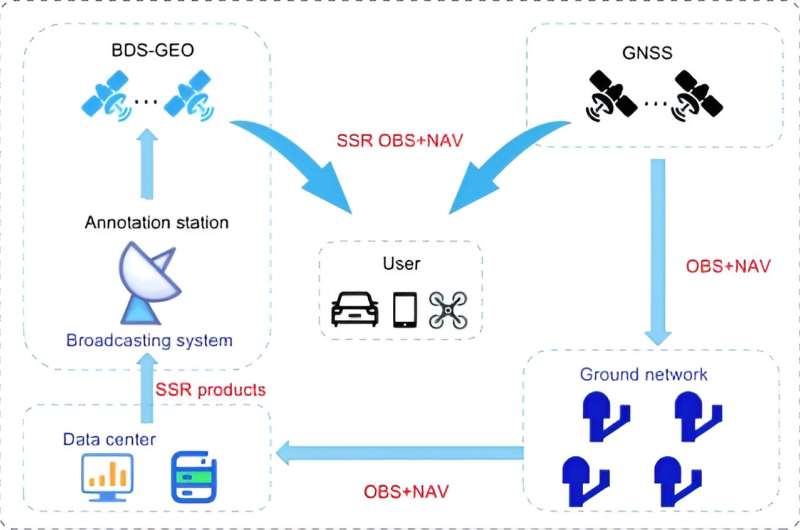 A model of the BeiDou navigation satellites system is seen at the 2020 China International Fair for Trade in Services (CIFTIS) in Beijing, China September 5, 2020.
A model of the BeiDou navigation satellites system is seen at the 2020 China International Fair for Trade in Services (CIFTIS) in Beijing, China September 5, 2020. China plans in 2027 to test the next generation of Beidou, the country's answer to the U.S.-owned GPS navigation system.
The rollout of the new system, expected to be complete by 2035, will provide users with more precise, real-time navigation
Reuters/Tingshu Wang/File Photo
From LightReading by Gigi Onag
China's version of GPS, BeiDou, is poised to build its next generation of satellites as it sets its sights on more projects at home and abroad that would use its satellite-based technology.
China has laid out the plan for the next generation of its homegrown BeiDou Navigation Satellite System (BDS), with three experimental satellites to be launched around 2027, network deployment to begin around 2029, and completion by 2035.
At a symposium in Beijing on Thursday to mark the system's 30th anniversary, the China Satellite Navigation Office (CNSO) said the next generation of the BDS "will provide highly accurate navigation, positioning and timing in real time, with accuracy levels ranging from meters to decimeters."
"It will be characterized by precision and trustworthiness, seamless accessibility, intelligent capabilities, network integration and adaptable flexibility," said Yang Changfeng, chief designer of the BDS, as quoted by the state-run Xinhua News Agency.
The system will support a wide range of ground and space-based user terminals and will integrate seamlessly with other non-satellite navigation and timing technologies.
To complement the next iteration of the BDS, an integrated and efficient ground system will also be established to ensure resource flexibility, data sharing and continuous operations.
China's version of GPS, BeiDou, is poised to build its next generation of satellites as it sets its sights on more projects at home and abroad that would use its satellite-based technology.
China has laid out the plan for the next generation of its homegrown BeiDou Navigation Satellite System (BDS), with three experimental satellites to be launched around 2027, network deployment to begin around 2029, and completion by 2035.
At a symposium in Beijing on Thursday to mark the system's 30th anniversary, the China Satellite Navigation Office (CNSO) said the next generation of the BDS "will provide highly accurate navigation, positioning and timing in real time, with accuracy levels ranging from meters to decimeters."
"It will be characterized by precision and trustworthiness, seamless accessibility, intelligent capabilities, network integration and adaptable flexibility," said Yang Changfeng, chief designer of the BDS, as quoted by the state-run Xinhua News Agency.
The system will support a wide range of ground and space-based user terminals and will integrate seamlessly with other non-satellite navigation and timing technologies.
To complement the next iteration of the BDS, an integrated and efficient ground system will also be established to ensure resource flexibility, data sharing and continuous operations.

Integrating LEO satellites
The CNSO also revealed that the next generation of BDS will have an optimized constellation architecture and will integrate LEO (low Earth orbit) satellites into the BDS constellation.
Currently, 45 BeiDou satellites form a "mixed constellation" above the Earth, which is currently composed of MEO (medium Earth orbit) and HEO (high Earth orbit) satellites.
The addition of LEO satellites to this "hybrid" configuration will further enable BDS to increase the accuracy of the system.
According to Xie Jun, deputy chief designer at BDS, LEO satellites can provide faster positioning speeds and better accuracy from the 10-meter to the 1-meter level, or even the decimeter and centimeter level.
"At that point, users will clearly notice that even in environments with interference or obstructions, the BDS will maintain high reliability, with excellent accuracy in positioning and timing," Xie told the China-based Global Times.
According to Xie Jun, deputy chief designer at BDS, LEO satellites can provide faster positioning speeds and better accuracy from the 10-meter to the 1-meter level, or even the decimeter and centimeter level.
"At that point, users will clearly notice that even in environments with interference or obstructions, the BDS will maintain high reliability, with excellent accuracy in positioning and timing," Xie told the China-based Global Times.

BDS PPP-AR/PPP-RTK service system.
Credit: Satellite Navigation (2024).
Giving GPS a run for its money
BeiDou is one of several global navigation satellite systems – others are Russia's GLONASS and EU's Galileo – that have emerged to challenge the 50-year dominance of GPS in providing positioning, navigation and timing (PNT) services.
These satellite-based navigation systems are used by a range of applications that operate critical infrastructure in a variety of sectors, including military and defense, energy, transportation and telecommunications.
BeiDou is one of several global navigation satellite systems – others are Russia's GLONASS and EU's Galileo – that have emerged to challenge the 50-year dominance of GPS in providing positioning, navigation and timing (PNT) services.
These satellite-based navigation systems are used by a range of applications that operate critical infrastructure in a variety of sectors, including military and defense, energy, transportation and telecommunications.
They are also now being used for applications that support industries such as finance and agriculture.
From a small regional network with few civilian users when the first two satellites were launched in 2000, there are now approximately 1.4 billion devices using the BeiDou system in China.
From a small regional network with few civilian users when the first two satellites were launched in 2000, there are now approximately 1.4 billion devices using the BeiDou system in China.
The system is widely used in transportation, agriculture, forestry and fisheries, hydrological monitoring, meteorological monitoring and forecasting, communication systems, power dispatching and emergency response, among others.
It is also gradually being integrated into China's national core infrastructure.
BDS services are now exported to more than 140 countries, including Russia, Pakistan, Belarus and several Arab countries.
BDS services are now exported to more than 140 countries, including Russia, Pakistan, Belarus and several Arab countries.
The system has also been integrated into the standards of 13 international organizations, including those for civil aviation, maritime and mobile communications.
Remarkably, BDS is now generally regarded as better than GPS in some areas.
Remarkably, BDS is now generally regarded as better than GPS in some areas.
According to the US-based National Space-Based Positioning, Navigation and Timing Advisory Board (PNTAB), the capabilities of GPS "are now substantially inferior to those of China's BeiDou."
A February 2023 paper from Harvard's Belfer Center for Science and International Affairs pointed out that the BeiDou constellation is newer and has more satellites than any other system, with more than ten times as many monitoring stations around the world as GPS.
The paper also highlighted the two-way messaging feature, which is only available on BeiDou satellites.
A February 2023 paper from Harvard's Belfer Center for Science and International Affairs pointed out that the BeiDou constellation is newer and has more satellites than any other system, with more than ten times as many monitoring stations around the world as GPS.
The paper also highlighted the two-way messaging feature, which is only available on BeiDou satellites.
It allows users to send short messages in areas with no ground network cell coverage, and can be used for search and rescue operations.
However, BeiDou's two-way messaging feature has some limitations, including the need for a dedicated receiver, which is not yet widely available in the commercial market.
However, BeiDou's two-way messaging feature has some limitations, including the need for a dedicated receiver, which is not yet widely available in the commercial market.
So far, it is mainly available in China.

Illustration: Lau Ka-kuen
BeiDou a critical component of China's 'low-altitude economy'
BeiDou satellites are expected to play a key role in China's nascent "low-altitude economy," where manned and unmanned vehicles deliver goods in small batches at altitudes of up to 1,000 meters.
These services are based on the integration of 5G, navigation and the LEOsat network.
Earlier this year, the Chinese government identified the low-altitude economy as a priority economic sector. Some insiders predict that this market will grow into a 2 trillion Chinese yuan ($280 billion) industry by 2030.
China Mobile has already outlined its plan to support the emerging sector, starting with the rollout of 100 low-altitude demonstration projects by 2025.
Earlier this year, the Chinese government identified the low-altitude economy as a priority economic sector. Some insiders predict that this market will grow into a 2 trillion Chinese yuan ($280 billion) industry by 2030.
China Mobile has already outlined its plan to support the emerging sector, starting with the rollout of 100 low-altitude demonstration projects by 2025.
These would include applications for low-altitude logistics, medical emergencies, airspace surveillance, emergency rescue and other scenarios.
Beyond China's low-altitude sector, BDS has made significant progress in applying its technology to a range of industries at home and abroad.
In October, the company secured CNY12.7 billion (US$1.78 billion) for new projects, including CNY7.83 billion ($1.1 billion) in investments to adopt the Chinese system for industrial and consumer use.
Beyond China's low-altitude sector, BDS has made significant progress in applying its technology to a range of industries at home and abroad.
In October, the company secured CNY12.7 billion (US$1.78 billion) for new projects, including CNY7.83 billion ($1.1 billion) in investments to adopt the Chinese system for industrial and consumer use.
An early warning system under Indonesia's disaster prevention agency was one of the signatories, although the value of the contract was not disclosed.
Citing Chinese officials, the South China Morning Post reported that the BDS system is already being used to help manage seaports in Pakistan, river transport in Myanmar, agriculture in Laos and urban planning in Brunei.
Citing Chinese officials, the South China Morning Post reported that the BDS system is already being used to help manage seaports in Pakistan, river transport in Myanmar, agriculture in Laos and urban planning in Brunei.
Links :
- LightReading : China sets ambitious goals for its BeiDou satellites
- SCMP : China’s next-gen BeiDou satellite system to ramp up rivalry with US-based GPS / After 30 years, China’s BeiDou is a GPS rival. Will the world enter its orbit?
- GlobalTimes : China to build next-gen BeiDou system, planning test satellite launches in 2027 and system completion by 2035
- NYTimes : GPS Threats
- Pulse : China announces plan to further shade GPS, dominate global PNT
- PayLoad : GPS Faces Growing Competition from China’s BeiDou
- GPS World : BeiDou Navigation Satellite System in 2024
- Developing Telecoms : Beidou to add LEOsats to its multi-orbit system starting in 2029
- SpaceNews : America is losing its GPS dominance to China’s BeiDou satnav
- EursianTimes : As GPS ‘Succumbs’ To EW Attacks, U.S. Air Force Seeks Alt. Positioning, Navigation & Timing System
- Techxplore : BeiDou satellite navigation system to undergo significant upgrade
No comments:
Post a Comment